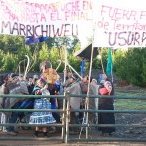English · Español

15 de octubre de 2014 | Entrevistas | Encuentro Monocultivos en América Latina | Acaparamiento de tierras | Anti-neoliberalismo | Derechos humanos | Luchadores sociales en riesgo | Soberanía Alimentaria
The cellulose-forestry model and plundering of the Mapuche people
Descargar: MP3 (2.3 MB)
The history of industrial tree monoculture plantations in Chile includes all the negative elements that feature these production models in Latin America: land grabbing, corporate capture of the State, loss of biodiversity, plundering and displacement of native communities. Another of these common features is that the opening of these businesses took place under dictatorships. In 1974, a year after staging a coup in the country, Augusto Pinochet passed Decree Law 701 aiming to promote the development of forestry in the Andean country.
But the promotion of this model did not end with the dictatorship in Chile. On the contrary, according to Millaray Painemal, Vice President of the Association of Rural and Indigenous Women of Chile (ANAMURI), this was further deepened with the implementation of neoliberal policies since democracy was established. In 2013, the Forestry Institute of Chile reported that in the 38 years of the decree law on forestry promotion, the State had granted 838 million dollars in bonds, mainly to three companies: Arauco, CMPC and Masisa, according to El Dínamo newspaper.
Millaray recently participated in the "Latin American Meeting on Large-Scale Monoculture Plantations in Latin America: land grabbing and threats to biodiversity and food sovereignty" in La Ceiba, Honduras. In an interview with Real World Radio, she considered that this space was key to understanding the resistance work against monoculture plantations on the continent and to "know that we are not alone, to build alliances and a common agenda to face the economic system, which is the one that is imposing these monocultures in our territories".
Part of the advance of these plantations has taken place throughout the decades on indigenous Mapuche people. But the people have set the recovery of lands from which they were displaced as a goal, even though their ancestral rights to the territory have been ignored by the Chilean State. Millaray, member of the Mapuche people, said: "People are coming back to where eucalyptus trees were planted; they cut them down and sow other crops. The idea is to resist the model on the spot, demanding that the State return those territories, which have always been ours".
According to Millaray, women are playing and have always played a key role in the resistance to the privatization of projects in Chilean territories: "In the 1990s, there were two emblematic leaders who strongly opposed the building of hydroelectric dams in Alto Bio Bio: Nicolasa and Berta Quintreman: "one of them passed away, but we know that she and her example remain among the new leaders who are appearing in the communities in rejection to these monoculture plantations", said Millaray.
In addition, she said that they have been leading the resistance processes and the marches and demonstrations, and that as a result they are also being criminalized. The criminalization of the Mapuche people is well known and it is exerted mainly through a tool created by the Chilean dictatorship: the Anti-Terrorism Law. Passed in 1984, the measure against social and popular struggles remains in place.
Imagen: www.soychile.cl








